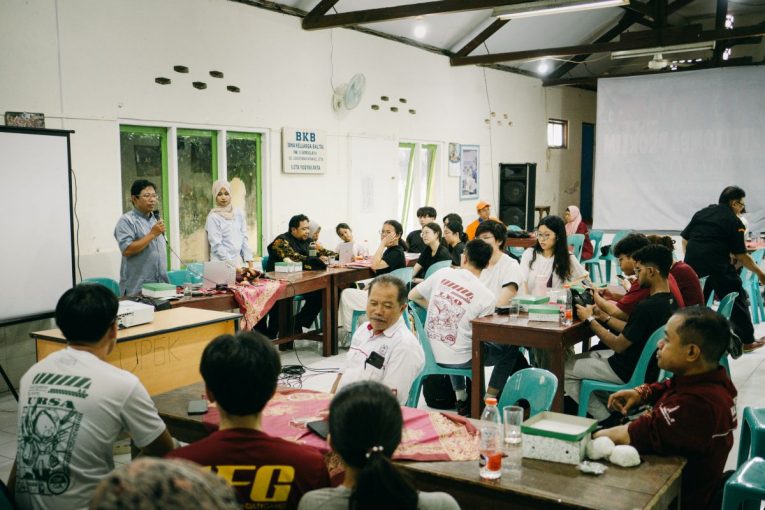
The Department of Public Policy and Management (DMKP), Faculty of Social and Political Sciences (FISIPOL) at Universitas Gadjah Mada (UGM), in collaboration with Residential College 4 (RC4) of the National University of Singapore (NUS), organized the Southeast Asia Friendship Initiative (SFI) 2025. This nine-day program, held from May 17–25, 2025, focused on issues of water governance, climate change, and community empowerment in Indonesian urban areas, particularly in Yogyakarta and Jakarta.
A total of 22 students from NUS, along with student facilitators from DMKP UGM, actively participated in the program. They were guided by faculty members from both institutions, including Dr. Erda Rindrasih, Dr. Ario Wicaksono, Dr. Dede Puji Setiono, and Dr. Navarun Varma from NUS. The program adopted participatory learning methods, such as field observations, stakeholder discussions, and research presentations.
The program began in Yogyakarta on May 17, 2025, with interviews and focus group discussions (FGDs) involving residents and local communities living in low-cost apartments (Rusunawa) and settlements along the Kali Code River. This was followed by site visits to priority areas, including slum revitalization projects, Sultan Ground settlements, and flood-prone zones along the river.
On May 19, students presented their preliminary findings, which highlighted critical environmental and social issues: pollution caused by untreated grey water directly discharged into rivers, increased stormwater runoff due to sealed land surfaces, erosion, deteriorating housing quality in overcrowded areas, and poor sanitation. NUS students also observed overlapping spatial functions in dense settlements—such as parking areas doubling as spaces for laundry and social activities—as well as unplanned building structures posing safety risks.
Government agencies played an important role in the program. The Public Works, Housing, and Energy and Mineral Resources Office (DPUP-ESDM) of Yogyakarta outlined strategies for mitigating water pollution, integrating urban development with environmental conservation, and strengthening community resilience along riverbanks.
The Public Works, Housing, and Settlement Office (DPUPKP) of Yogyakarta City introduced two flagship programs: M3K (Mundur, Munggah, Madhep Kali), aimed at improving basic infrastructure access along riversides, and MAHANANNI, which promotes land consolidation to create sustainable and livable vertical housing and organized settlements.
The Yogyakarta session concluded with a presentation from the Regional Disaster Management Agency (BPBD) of Yogyakarta City, emphasizing the importance of clean water management as part of disaster resilience strategies.
On May 22, participants continued their field study in Jakarta. The agenda opened with discussions with local officials on coastal reclamation projects in North Jakarta, followed by a direct boat observation of the Giant Sea Wall (GSW)—a component of the National Capital Integrated Coastal Development (NCICD) project. The initiative seeks to prevent tidal flooding while revitalizing coastal areas through integrated drainage systems and reclamation islands.
Students also engaged with the Ministry of Public Works and Housing (PUPR) on issues of integrating the GSW project into urban spatial planning, challenges of relocating informal settlements, and the development of safe and sustainable vertical housing.
The following day, the Jakarta Provincial Housing and Settlement Agency (DPRKP) shared its strategies for managing riverside settlements through participatory approaches. The discussions included defining adequate housing indicators, community engagement, and evaluating relocation programs.
The fieldwork concluded with a visit to the downstream area of the Ciliwung River in Condet, where students engaged with local communities about the differences between river “normalization” and “naturalization” approaches. They also visited multiple housing sites: relocation villages, existing non-relocated settlements, and Rusunawa housing complexes for relocated residents.
The Southeast Asia Friendship Initiative (SFI) 2025 not only strengthened academic collaboration between UGM and NUS but also fostered the development of research-based solutions to real-world challenges in water governance, urban settlements, and climate change in Southeast Asian cities. Students gained first-hand experience in fieldwork, cross-cultural discussions, and policy analysis—skills crucial in addressing today’s global challenges.
This program also contributes to the Sustainable Development Goals (SDGs), particularly SDG 6 (Clean Water and Sanitation) through discussions on water pollution and clean water management; SDG 11 (Sustainable Cities and Communities) through initiatives on slum upgrading, safe housing, and participatory urban governance; and SDG 13 (Climate Action) through the integration of climate resilience in urban development policies. Moreover, it embodies SDG 17 (Partnerships for the Goals) by strengthening collaboration between universities and governments across borders.
